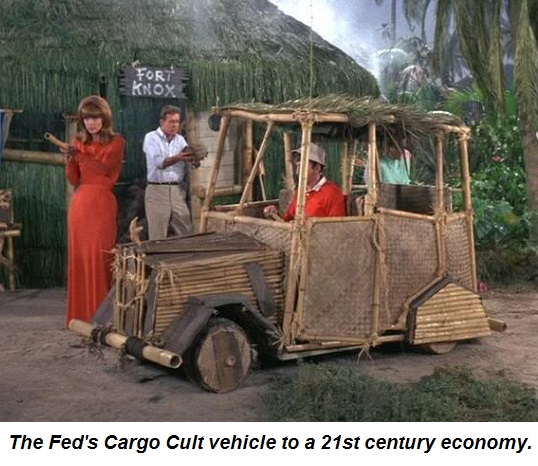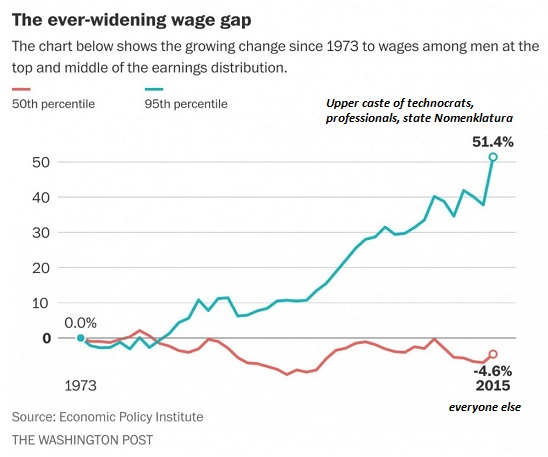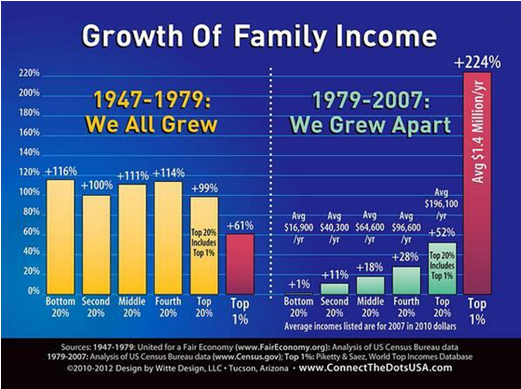The banquet of consequences is about to be served.
If we step back and look at what's happened since the Global Financial Crisis of 2008-09, it's easy to see that the global leadership has chosen to do more of what's failed spectacularly.
Since the Global Financial Meltdown, central bankers and planners have pursued policies designed to boost global stock markets to create a wealth effect in which people will be psychologically inclined to borrow and spend more because their stock market/IRA portfolios are rising. This supposedly encourages them to spend this "paper wealth."
But the policy runs aground on two realities: 1) only the top 5% of the households own enough stocks to make a difference to their wealth (and their perception of wealth, i.e. the wealth effect), and 2) the wealth effect only occurs in "good times" when people feel the economy is healthy and their prospects are improving.
When people sense the economy is unhealthy and their prospects have dimmed, they save more regardless of how much the stock market rises.

Signs of financial craziness abound:
-- 25% of all stock market gains occur after Federal Reserve meetings: in other words, central banks "own the market."
-- The Swiss central bank admitted to spending $470 billion on currency market manipulation since 2010.
-- Other central banks have intervened in the stock and bond markets to the tune of trillions of dollars/yen/euro/yuan.
-- The central bank of China has spent over $100 billion in a few months propping up the yuan.
-- China has made it easier to borrow money again, sparking yet another housing bubble in First Tier cities like Shanghai and Beijing--as if another housing bubble will fix what's broken in China's economy.
-- U.S. corporations have borrowed billions of dollars at 1% to buy back their own shares--a dynamic that may account for 50% of the current rise in the stock market.
-- ObamaCare has added costs to the healthcare system rather than reducing costs; though healthcare spending adds to GDP, it is a form of consumption, not production.
-- Cheap credit enabled energy companies to boost production to the point that oil is now in over-supply--and the need for revenues to fund the debts taken on to expand production force producers to keep pumping.
-- Sweden has dropped its interest rate to negative territory, a policy that has sparked an insane housing bubble.
And this is considered sane and healthy?
In other words, central banks and planners have generated enormous bubbles in debt, housing and stocks to maintain the illusion that doing more of what failed spectacularly will actually fix what's broken. This is crazy, because these policies are what's broken. All these massive interventions and manipulations are driving the system off the cliff.
Longtime correspondent J.B. recently shared some personal observations about the craziness of the current American economy:
"I have to say I think things are even crazier now than is 2002-06.
Look back to then and attempt to gauge how your thinking has changed.
I guess back then I never realized how corrupt the government and Federal Reserve were/are. I actually did think we had a government which cared about the people. How naïve of me. I just thought they were stupid.
There have been no jobs created which pay anything except for programmers working on start-ups with billion dollar valuations which make no money. Interest rates have been driven so low that people have stepped out into High Yield and will lose most their money. The stock market really trades on no fundamentals except what the latest Fed head comes out and says that day. The only investment that your gut feel says should go up (gold) has been in the crapper for several years (do you think the Fed is suppressing in?)
I have to tell you there seems to be a lot of new restaurants popping up in L.A.; most do not seem to last and many of the old ones seem to disappear. We had friends in from France (she is French but a US citizen and lived in LA for quite a while). The one comment they had was they could not believe how expensive food is.
Every government unit in the United States (federal, state, county, etc.) is having to borrow and borrow. Basically they are all bankrupt."
J.B. mentions food and restaurants, but we all know costs are out of control in big-ticket items: rent, tuition, healthcare.
I recently posted a link that public university tuition has soared 135% to 145% in the decade from 2004 to 2014--a period in which "official" inflation rose 25%.
We recently helped a neighbor get home from the hospital after emergency surgery for acute appendicitis. He told us a visiting-scholar friend from Europe who recently went to the emergency room was billed $12,000 for the visit, which did not include any surgery or procedures.
Americans with gold-plated healthcare coverage don't see what the system bills or what is actually paid, so completely outrageous bills are commonplace.
(Note that caregivers aren't necessarily benefiting from these soaring costs to consumers, insurers, etc.--many physician correspondents have explained that their income has declined significantly in the past few years, extending a decades-long trend. In regions with a shortage of nurses, pay has risen markedly, but in other regions, nurses' compensation has not risen along with higher healthcare costs.)

High-end restaurants are indeed opening not just in L.A. and San Francisco, but in smaller cities and even towns--as if the populace with sufficient cash or credit to spend $100 on dinner for two is unlimited.
With rising rents, regulatory compliance, workers comp and wages, businesses are jacking up the price of their product/service just to cover the increases in their own expenses.
Corporations are cutting corners by reducing the contents of packages and reducing the quality of their ingredients/products.
Here is the craziness: nothing has actually been fixed in the past 7 years.Rather, everything that was broken in 2008 has been ramped up to an even higher levels of craziness.
The crazy solution to bursting housing bubbles is even bigger housing bubbles (see Sweden, China and the U.S.).
The failure of central planning (super-low interest rates, easy credit, etc.) has led to extreme extensions of the very policies that made the global financial meltdown inevitable.
Yet strangely, we accept this craziness as the New Normal. People with demanding jobs in Corporate America are working harder and longer for less pay (eroded by inflation) to the point of physical, emotional and psychological exhaustion. But the mortgage and bills must be paid, so they continue sacrificing their health for the sake of supporting an unsupportable lifestyle.
We now have a TINA economy--there is no alternative. People feel trapped, unable to choose another way of living and another livelihood, because all the alternatives mean sacrificing discretionary income--often by 2/3. The person earning $90,000 in Corporate America or the government can only earn $30,000 if they bailed out and took a less insane job.

Eventually, things start breaking. The overworked person's health breaks. The corporate bond market breaks, as debt that can't be paid is not paid. Small businesses break, close their doors and the owners retire or move on to some sort of work that is less stressful. The Venture Capital bubble of throwing millions of dollars at Unicorn startups with no revenues breaks.
Blind, destructive craziness has costs. The supposed benefits of doing more of what failed spectacularly are short-term, and they're finally starting to run out.
The banquet of consequences is about to be served.
My new book is #2 on Kindle short reads -> politics and social science: Why Our Status Quo Failed and Is Beyond Reform ($3.95 Kindle ebook, a 20% discount thru May 1, $8.95 print edition) For more, please visit the book's website.
My new book is #2 on Kindle short reads -> politics and social science: Why Our Status Quo Failed and Is Beyond Reform ($3.95 Kindle ebook, a 20% discount thru May 1, $8.95 print edition) For more, please visit the book's website.
NOTE: Contributions/subscriptions are acknowledged in the order received. Your name and email remain confidential and will not be given to any other individual, company or agency.
Thank you, Lynn M. ($75), for your outrageously generous contribution to this site -- I am greatly honored by your steadfast support and readership.
|
Thank you, Alex V. ($5), for your most generous contribution to this site -- I am greatly honored by your support and readership.
|
